简介
正则表达式(regular expression)描述了一种字符串匹配的模式(pattern),可以用来检查一个串是否含有某种子串、将匹配的子串替换或者从某个串中取出符合某个条件的子串等。
常用正则表达式
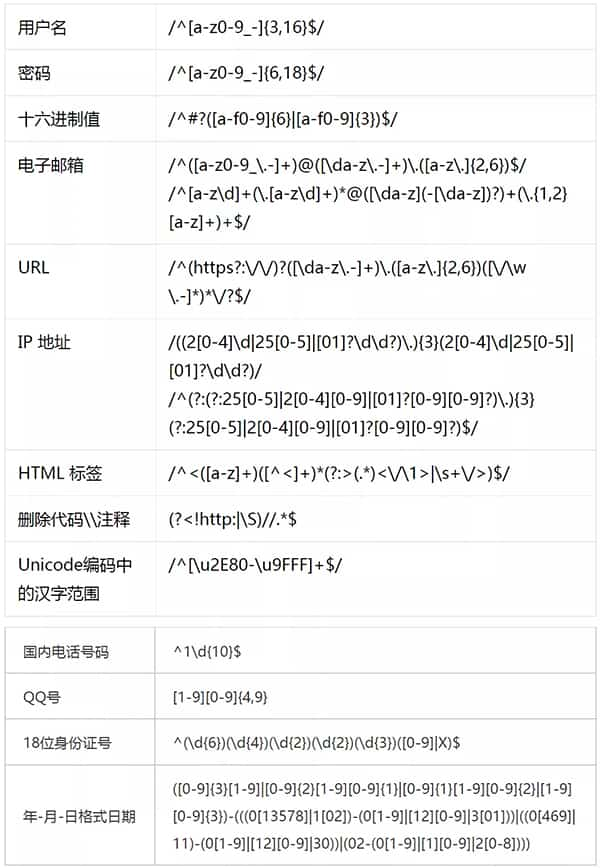
常用字符
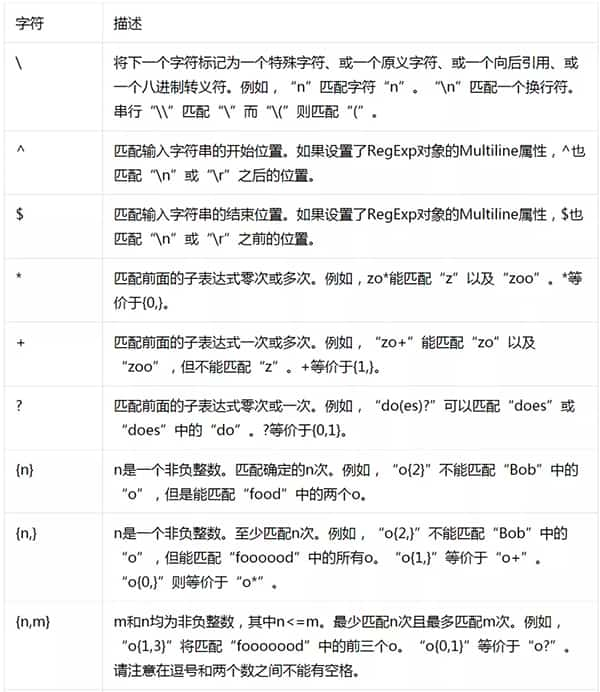
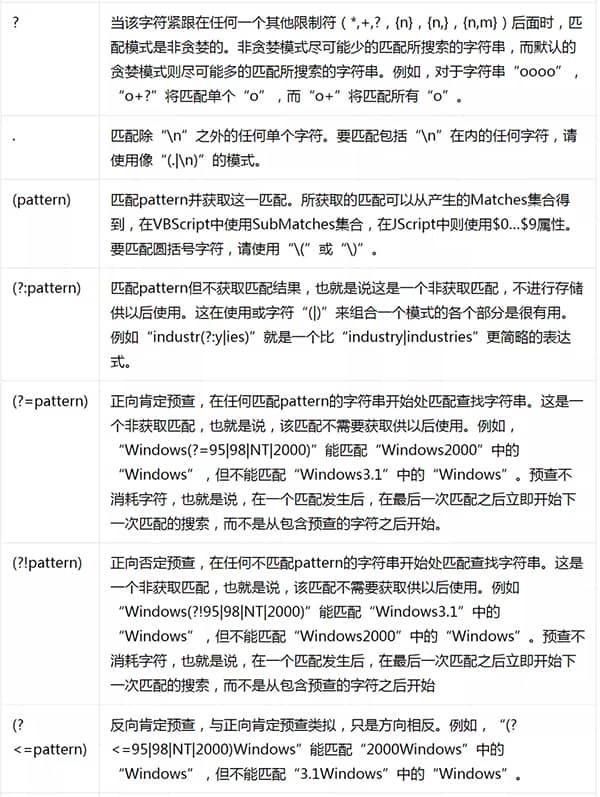
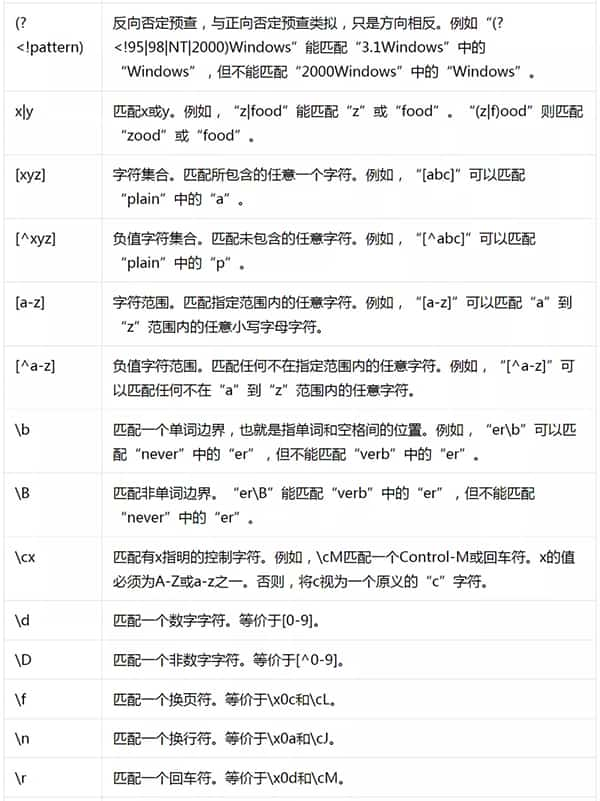
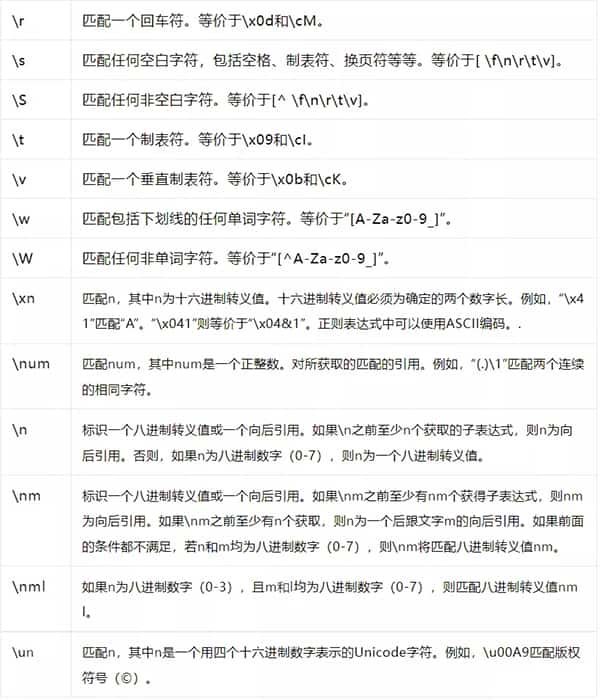
普通字符
普通字符主要讲解以下内容,并举例说明
-
// String regStr = "[a-z]";//匹配a-z中任意一个字符
-
// String regStr = "[A-Z]";//匹配A-Z中任何一个字符
-
// String regStr = "abc";//匹配字符串abc
-
// String regStr = "(?i)abc";//匹配字母abc不区分大小写
-
// String regStr = "[0-9]";//匹配0-9任何一个字符
-
// String regStr = "[^0-9]";//匹配不是0-9中的任何一个字符
-
// String regStr = "[^0-9]{2}";//匹配2个不是0-9的字符
-
// String regStr = "\\d";//匹配任何一个数字字符,等价于[0-9]
-
// String regStr = "\\D";//匹配任何一个非数字字符,等价于[^0-9]
-
// String regStr = "\\w";//匹配任何一个数字、字母、下划线,等价于[0-9a-zA-Z_]
-
// String regStr = "\\W";//匹配任何一个除了数字、字母、下划线,等价于[^0-9a-zA-Z_]
-
// String regStr = "\\s";//匹配任何一个空字符
-
// String regStr = "\\S";//匹配任何一个非空字符
-
// String regStr = "ab|cd";//选择匹配符,匹配字符串ab或者cd
1) String regStr = "[a-z]";//匹配a-z中任意一个字符
-
@Test
-
public void test1() {
-
String str = "abc2021";
-
String regStr = "[a-z]";
-
Pattern compile = Pattern.compile(regStr);
-
Matcher matcher = compile.matcher(str);
-
while(matcher.find()){
-
System.out.println("匹配到的数据为:"+matcher.group(0));
-
}
-
}
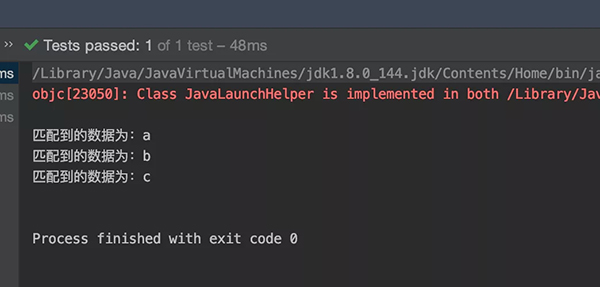
结果展示
2) String regStr = "[A-Z]";//匹配A-Z中任何一个字符
-
@Test
-
public void test2(){
-
String str = "ABCabc2021";
-
String regStr = "[A-Z]";
-
Pattern compile = Pattern.compile(regStr);
-
Matcher matcher = compile.matcher(str);
-
while(matcher.find()){
-
System.out.println("匹配到的数据为:"+matcher.group(0));
-
}
-
}

结果展示
3)String regStr = "abc";//匹配字符串abc
-
@Test
-
public void test2(){
-
String str = "ABCabc2021";
-
String regStr = "abc";
-
Pattern compile = Pattern.compile(regStr);
-
Matcher matcher = compile.matcher(str);
-
while(matcher.find()){
-
System.out.println("匹配到的数据为:"+matcher.group(0));
-
}
-
}
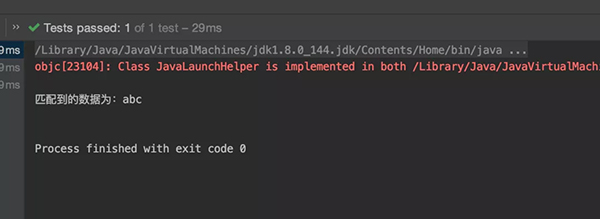
结果展示
4)String regStr = "(?i)abc";//匹配字母abc不区分大小写
-
@Test
-
public void test2(){
-
String str = "ABCabc2021";
-
String regStr = "(?i)abc";
-
Pattern compile = Pattern.compile(regStr);
-
Matcher matcher = compile.matcher(str);
-
while(matcher.find()){
-
System.out.println("匹配到的数据为:"+matcher.group(0));
-
}
-
}
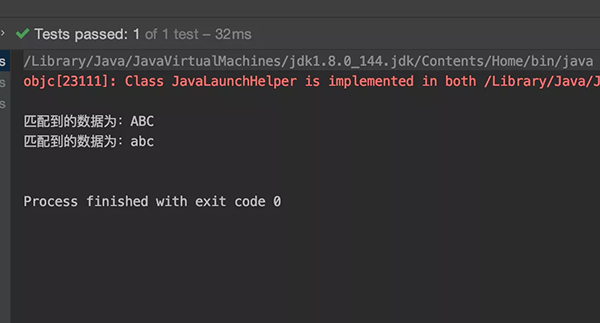
结果展示
5) String regStr = "[0-9]";//匹配0-9任何一个字符
-
@Test
-
public void test2(){
-
String str = "ABCabc2021";
-
String regStr = "[0-9]";
-
Pattern compile = Pattern.compile(regStr);
-
Matcher matcher = compile.matcher(str);
-
while(matcher.find()){
-
System.out.println("匹配到的数据为:"+matcher.group(0));
-
}
-
}
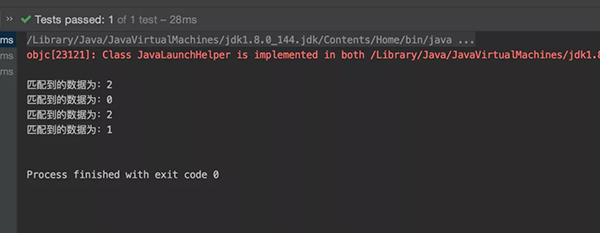
结果展示
6) String regStr = "[^0-9]";//匹配不是0-9中的任何一个字符
-
@Test
-
public void test2(){
-
String str = "ABCabc2021";
-
String regStr = "[^0-9]";
-
Pattern compile = Pattern.compile(regStr);
-
Matcher matcher = compile.matcher(str);
-
while(matcher.find()){
-
System.out.println("匹配到的数据为:"+matcher.group(0));
-
}
-
}
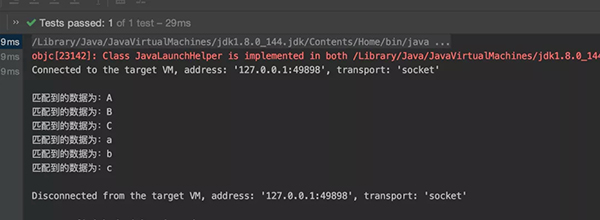
结果展示
限定符
-
/**
-
* 限定符
-
* *:表示出现任意次数,0次或者n次,如(abc)*表示abc出现0次或者多次
-
* +:表示出现至少1次或者n次,如(abc)+表示abc出现1次或者多次
-
* ?:表示出现至少0次或者1次,如abc?表示c出现0次或者1次
-
* {n}:表示出现n次,如[0-9]{2},表示匹配2次数字
-
* {n,}表示至少出现n次,如[0-9]{3,}表示匹配至少3次数字
-
* {n,m}表示出现至少n次,最多m次,如[0-9]{2,4}表示匹配次数2-4次数字
-
*/
1) *:表示出现任意次数,0次或者n次
-
@Test
-
public void test2(){
-
String str = "zypabcabc2021";
-
String regStr = "zyp(abc)*";
-
Pattern compile = Pattern.compile(regStr);
-
Matcher matcher = compile.matcher(str);
-
while(matcher.find()){
-
System.out.println("匹配到的数据为:"+matcher.group(0));
-
}
-
}

结果展示
2)+:表示出现至少1次或者n次,如(abc)+表示abc出现1次或者多次
-
@Test
-
public void test2(){
-
String str = "zypabc2021";
-
String regStr = "zyp(abc)+";
-
Pattern compile = Pattern.compile(regStr);
-
Matcher matcher = compile.matcher(str);
-
while(matcher.find()){
-
System.out.println("匹配到的数据为:"+matcher.group(0));
-
}
-
}
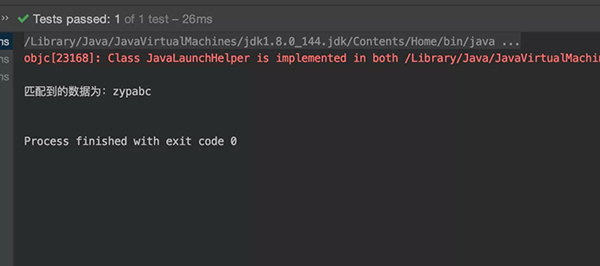
结果展示
3)?:表示出现至少0次或者1次,如abc?表示c出现0次或者1次
-
@Test
-
public void test2(){
-
String str = "zyp2021";
-
String regStr = "zyp(abc)?";
-
Pattern compile = Pattern.compile(regStr);
-
Matcher matcher = compile.matcher(str);
-
while(matcher.find()){
-
System.out.println("匹配到的数据为:"+matcher.group(0));
-
}
-
}
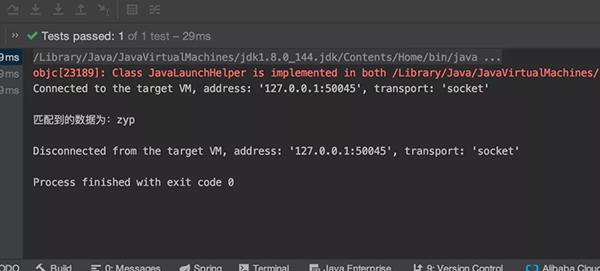
结果展示
4){n}:表示出现n次,如[0-9]{2},表示匹配2次数字
-
@Test
-
public void test2(){
-
String str = "zyp2021";
-
String regStr = "[0-9]{2}";
-
Pattern compile = Pattern.compile(regStr);
-
Matcher matcher = compile.matcher(str);
-
while(matcher.find()){
-
System.out.println("匹配到的数据为:"+matcher.group(0));
-
}
-
}
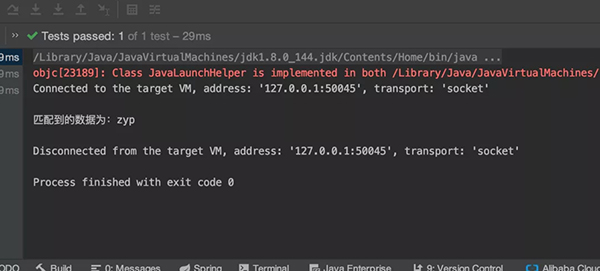
结果展示
5){n,}表示至少出现n次,如[0-9]{3,}表示匹配至少3次数字
-
@Test
-
public void test2(){
-
String str = "zyp2021";
-
String regStr = "[0-9]{2,}";
-
Pattern compile = Pattern.compile(regStr);
-
Matcher matcher = compile.matcher(str);
-
while(matcher.find()){
-
System.out.println("匹配到的数据为:"+matcher.group(0));
-
}
-
}
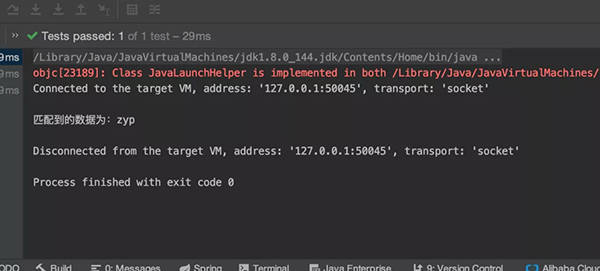
结果展示
6){n,m}表示出现至少n次,最多m次,如[0-9]{2,4}表示匹配次数2-4次数字
-
@Test
-
public void test2(){
-
String str = "zyp2021";
-
String regStr = "[0-9]{2,4}";
-
Pattern compile = Pattern.compile(regStr);
-
Matcher matcher = compile.matcher(str);
-
while(matcher.find()){
-
System.out.println("匹配到的数据为:"+matcher.group(0));
-
}
-
}
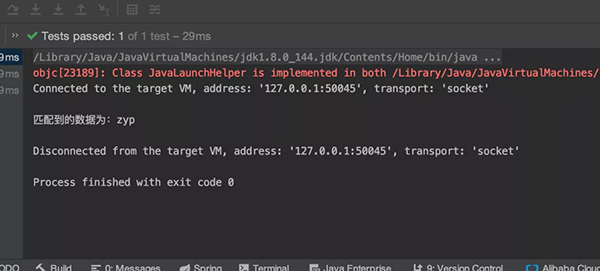
结果展示
定位符
-
/**
-
* 定位符
-
* ^:表示字符串以什么开头的意思。如:有一个字符串123abc,正则为^[0-9]+[a-z]*(必须已数字开头),则能成功匹配上。如果字符串为a123abc则匹配不上
-
* $:表示字符串以什么结束的意思。如:有一个字符串123abc,正则为^[0-9]+[a-z]+$(表示以数字开头,字母结尾)则能成功匹配上。如果字符串为a123abc1则匹配不上
-
* \\b:表示边缘匹配(字符串的结尾或者空格之后)。有一个字符串abc123abc,正则为abc\\b,匹配到的为最后的那个abc
-
* \\B:与\\b相反
-
*/
1) ^:表示字符串以什么开头的意思
-
@Test
-
public void test2(){
-
String str = "2021zyp";
-
String regStr = "^[0-9]+";
-
Pattern compile = Pattern.compile(regStr);
-
Matcher matcher = compile.matcher(str);
-
while(matcher.find()){
-
System.out.println("匹配到的数据为:"+matcher.group(0));
-
}
-
}
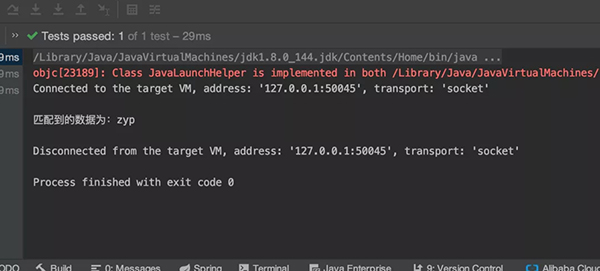
结果展示
2) $:表示字符串以什么结束的意思
-
@Test
-
public void test2(){
-
String str = "2021zyp";
-
String regStr = "[0-9]$";
-
Pattern compile = Pattern.compile(regStr);
-
Matcher matcher = compile.matcher(str);
-
while(matcher.find()){
-
System.out.println("匹配到的数据为:"+matcher.group(0));
-
}
-
}
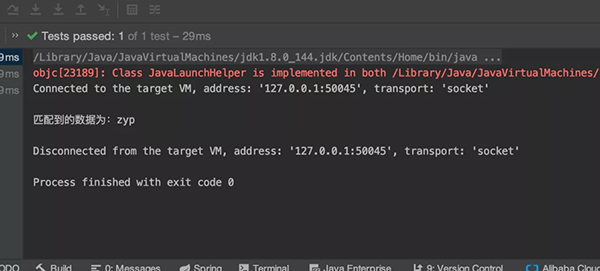
没有匹配到,因为要以数字结束
3) \\b:表示边缘匹配(字符串的结尾或者空格之后)
-
@Test
-
public void test2(){
-
String str = "zyp2021zyp";
-
String regStr = "zyp\\b";
-
Pattern compile = Pattern.compile(regStr);
-
Matcher matcher = compile.matcher(str);
-
while(matcher.find()){
-
System.out.println("匹配到的数据为:"+matcher.group(0));
-
}
-
}
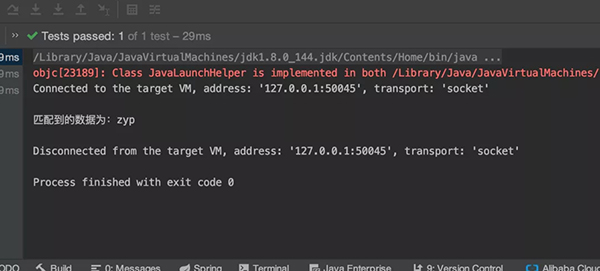
匹配到的是最后一个“zyp”
4) \\B:与\\b相反
-
@Test
-
public void test2(){
-
String str = "zyp2021zyp";
-
String regStr = "zyp\\B";
-
Pattern compile = Pattern.compile(regStr);
-
Matcher matcher = compile.matcher(str);
-
while(matcher.find()){
-
System.out.println("匹配到的数据为:"+matcher.group(0));
-
}
-
}
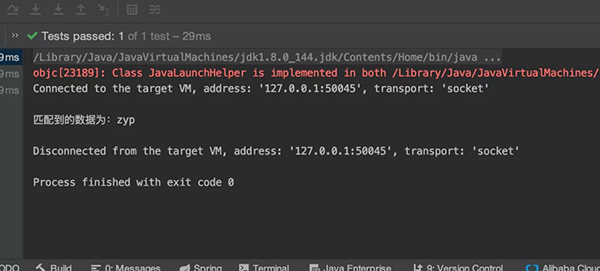
匹配到的是第一个“zyp”
分组
-
/**
-
* 分组:可分为捕获分组和非捕获分组
-
* 1.捕获分组:
-
* 1)如(\\d\\d)(\\d\\d)表示匹配4位数字,如果字符串位2021abcd,
-
* 我们通过matcher.group(0)得到2021
-
* 通过matcher.group(1)得到20
-
* 通过matcher.group(2)得到21
-
* 由此可见()起到分组的作用
-
*
-
* 2)如(?<a1>\\d\\d)(?<a2>\\d\\d)表示匹配4位数字,如果字符串位2021abcd,
-
* 我们通过matcher.group(0)得到2021
-
* 通过matcher.group(1)得到20,还可以通过matcher.group(a1)得到20
-
* 通过matcher.group(2)得到21,还可以通过matcher.group(a2)得到21
-
* 由此可见()起到分组的作用
-
*
-
* 2.非捕获分组:不能通过group(1)或者group(2)获取值
-
* 1)如20(?:20|21|22)表示匹配2020|2021|2022
-
* 2) 如20(?=20|21|22)表示匹配2020或2021或2022中的20
-
* 3)如20(?!20|21|22)表示匹配不匹配2020或2021或2022中的20,匹配其它20
-
*
-
*/
捕获分组
1)如(\\d\\d)(\\d\\d)表示匹配4位数字,如果字符串为2021abcd,
-
@Test
-
public void test2(){
-
String str = "2021abcd";
-
String regStr = "(\\d\\d)(\\d\\d)";
-
Pattern compile = Pattern.compile(regStr);
-
Matcher matcher = compile.matcher(str);
-
while(matcher.find()){
-
System.out.println("matcher.group(0):"+matcher.group(0));
-
System.out.println("分组一:matcher.group(1):"+matcher.group(1));
-
System.out.println("分组二:matcher.group(2):"+matcher.group(2));
-
}
-
}
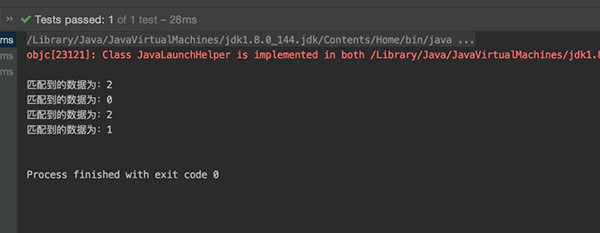
结果展示
结论:由此可见()会将正则分组,并按顺序给出编号,从1开始
2) (?<a1>\\d\\d)(?<a2>\\d\\d)表示匹配4位数字,如果字符串位2021abcd
-
@Test
-
public void test2(){
-
String str = "2021abcd";
-
String regStr = "(?<a1>\\d\\d)(?<a2>\\d\\d)";
-
Pattern compile = Pattern.compile(regStr);
-
Matcher matcher = compile.matcher(str);
-
while(matcher.find()){
-
System.out.println("matcher.group(0):"+matcher.group(0));
-
System.out.println("分组一:matcher.group(1):"+matcher.group(1));
-
System.out.println("分组二:matcher.group(2):"+matcher.group(2));
-
System.out.println("分组名a1:matcher.group(1):"+matcher.group("a1"));
-
System.out.println("分组名a2:matcher.group(2):"+matcher.group("a2"));
-
}
-
}

结果展示
结论:由此可见()除了能将正则分组,还能按顺序给出编号,从1开始。还可以给分组取名字,并根据名字获取对应匹配的值
非捕获分组
1)如20(?:20|21|22)表示匹配2020|2021|2022
-
@Test
-
public void test2(){
-
String str = "2021a2022B2023";
-
String regStr = "20(?:20|21|22)";
-
Pattern compile = Pattern.compile(regStr);
-
Matcher matcher = compile.matcher(str);
-
while(matcher.find()){
-
System.out.println("匹配到的数据为:"+matcher.group(0));
-
}
-
}
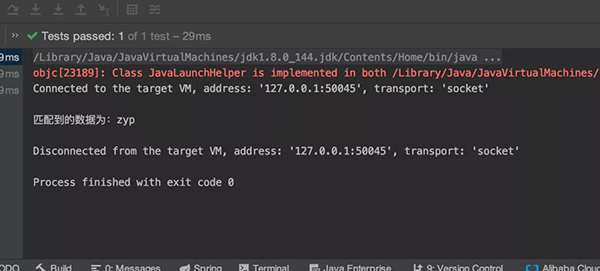
结果展示
2)如20(?=20|21|22)表示匹配2020或2021或2022中的20
-
@Test
-
public void test2(){
-
String str = "2021a2022B2023";
-
String regStr = "20(?=20|21|22)";
-
Pattern compile = Pattern.compile(regStr);
-
Matcher matcher = compile.matcher(str);
-
while(matcher.find()){
-
System.out.println("匹配到的数据为:"+matcher.group(0));
-
}
-
}
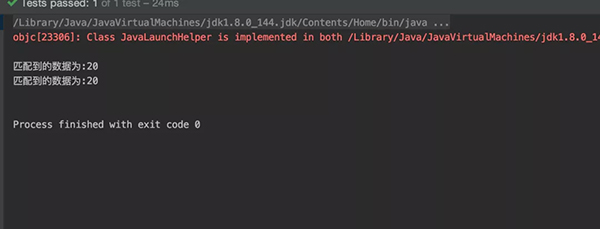
这里匹配到的20,为2021和2022中的20
3)如20(?!20|21|22)表示匹配不匹配2020或2021或2022中的20,匹配其它20
-
@Test
-
public void test2(){
-
String str = "2021a2022B2023";
-
String regStr = "20(?!20|21|22)";
-
Pattern compile = Pattern.compile(regStr);
-
Matcher matcher = compile.matcher(str);
-
while(matcher.find()){
-
System.out.println("匹配到的数据为:"+matcher.group(0));
-
}
-
}
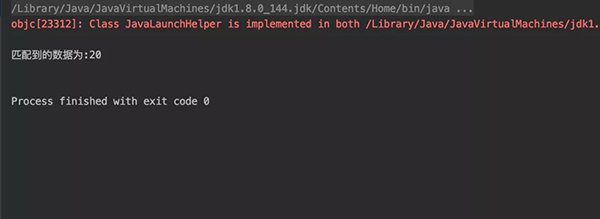
这里匹配到的20为2023中的20
反向引用
-
/**
-
* 反向引用
-
* 如果我们要找到一个字符串中连续4位威数字,并且第一位和第4位要相同,第二位和第三位相同。
-
* 这时候我们使用反向引用就很简单
-
* 反向引用的内部用法:\\n其中n代表分组号,如:字符串12345678870008,正则为(\\d)(\\d)\\2\\1
-
* 反向引用的外部用法:$n其中n代表分组号
-
*/
字符串12345678870008,正则为(\\d)(\\d)\\2\\1
-
@Test
-
public void test2(){
-
String str = "12345678870008";
-
/**
-
* 第一个(\\d)会分配的组为1
-
* 第2个(\\d)会分配的组为2
-
* \\2:表示引用组2的值,因此2和3的值就会相同
-
* \\1:表示引用组1的值,因此1和4的值会相同
-
*/
-
String regStr = "(\\d)(\\d)\\2\\1";
-
Pattern compile = Pattern.compile(regStr);
-
Matcher matcher = compile.matcher(str);
-
while(matcher.find()){
-
System.out.println("匹配到的数据为:"+matcher.group(0));
-
}
-
}
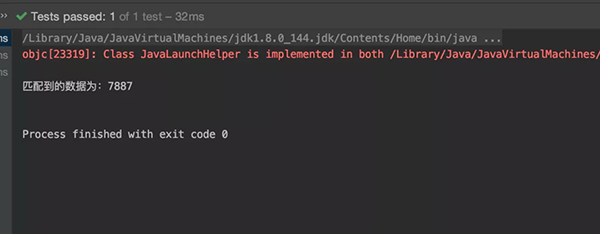
结果展示
原文链接:https://mp.weixin.qq.com/s/uJD7O_XsopwwMXdpPZJ0SA
本文由主机测评网发布,不代表主机测评网立场,转载联系作者并注明出处:https://zhuji.jb51.net/linux/5657.html